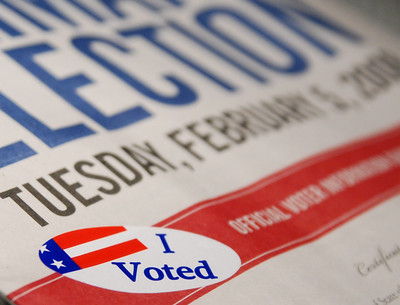Don’t forget to make your voice heard next Tuesday, March 5, 2024, in the Presidential Primary! In addition to picking delegates to choose your presidential preference at the party conventions in the summer, voters will decide who will represent them in the state party for the next four years and who will serve them on their local party committee. Massachusetts holds semi-open primaries, meaning that if you are registered for a political party, you can only vote in that party’s election. Still, if you are unaffiliated you can pick which party you vote in. Thanks to post-COVID reforms, residents have been able to vote by mail or early vote in person, but polls will still be open on Tuesday for those who prefer the old-fashioned way.
While we’re all used to seeing the Democratic Party represented by the color blue and the Republican Party represented by the color red on election night, there’s no need to stress when you get the opposite color on election day. When television studios first started to use color to represent who won a state the colors were flipped and Massachusetts’ ballots were developed using this old color scheme. It wasn’t until the 2000 election that red and blue were cemented into the national psyche to what they are today.
The first Tuesday in March, which is when we hold our Presidential Primaries, is part of Super Tuesday. Super Tuesday has developed into the day that makes or breaks campaigns because so many states hold their elections at the same time. This year, 15 states representing about 30% of each party’s delegates are taking part in Super Tuesday. The idea of Super Tuesday stems from states grouping their primaries to gain sway over national politics. In 1988, Southern Democrats were getting frustrated with how thoroughly the Republicans had beaten them recently and feared that the party kept putting up weak, politically questionable candidates, so they came up with the idea for a Southern State primary to elect a moderate Southerner. While this didn’t work in 1988, 1992 saw the Southern States primary elect Arkansas Governor, Bill Clinton, providing him a pathway to the White House. As we all know, this strategy ended up working with the Democrats, as Clinton won several more conservative states and won the Presidency.
While the presidential primary isn’t as flashy this year with clear front runners, it is still an important time to make your voices heard. When you sit on the sidelines and don’t participate, you can ultimately allow a fraction of the population to decide for you. As a warning of how extreme this can be, this year’s Iowa Republican Caucus saw former President Trump win with only 56,000 votes. This amounted to 1.7% of the state of Iowa deciding for all three million people.
If you need information on where to vote, click the link below!






